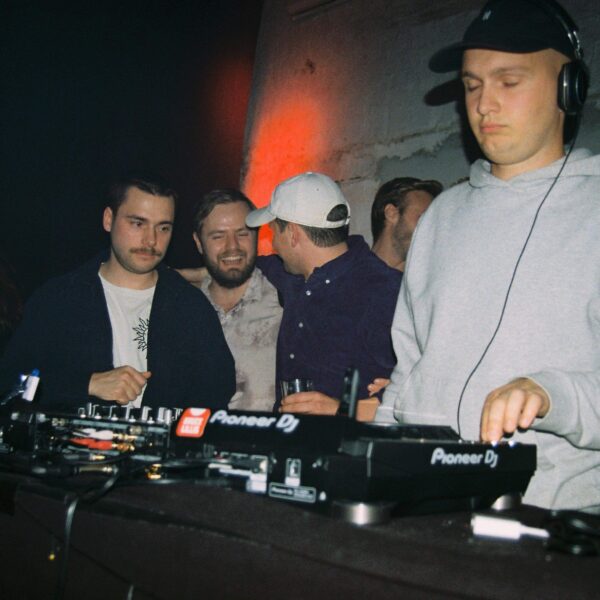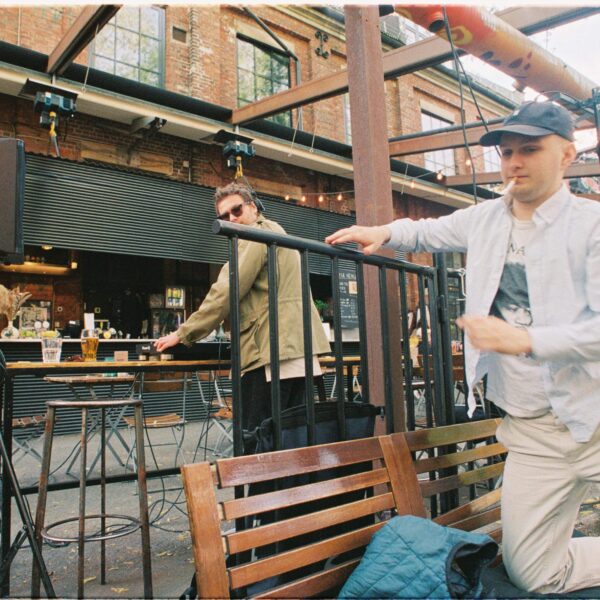In the BCR triad of creators we’ve spent a lot of time focussing on two, namely Anders Hajem and Henrik Villard. Always at hand with the next release, a mix or some kind of musical news, Anders and Henrik are responsible for the majority of BCR’s output, seemingly, but not actually, neglecting their third, Perkules aka Jens Wabo.
While Jens has been the quieter member of the group, his presence is no less trivial. As a founding member he orchestrates much of the label, events and now mix franchise, even while as an artist he favours a more conservative output. Apart from a couple of singles in 2021, he’s remained content with his duties behind the decks, and when he does release something he offers a little outlier to the norm both at BCR and any concurrent dance floor trends.
His latest, “Show me Right” is an infectious exercise in crossing the lines between saccharine bubblegum melodies and functional House grooves. With a percussive palette going off-script in the Roland X0X annals and with uplifting chords issuing from some distant nostalgia, there’s a lot to appreciate and much that entices.
It’s only his third release, all of which come via the BCR platform, and challenges any generic status quo in terms of sound if any did indeed exist. It arrived on BCR last month and with more slated for the near future including a remix from Justin Cudmore for Perkules, there is much percolating on the Perkules front, so we took at as a premise to finally interview the third member of BCR and complete the triptych.
We caught up with Jens during a sunny day in June, the week after launching the return of their Summer Residency, Sundaze at Jaeger. Like Anders and Henrik, Jens is a reserved character, a stoic quiet kind of person that seems mature beyond his years. We have much to discuss, and to me he’s still very much a blank slate, a piece of the BCR puzzle that will finally complete our purview of the Oslo label and events series.
Where do you fit into the BCR universe?
Anders and Henrik are super ambitious in their artistic pursuits. They are constantly in the studio making three to five songs a week, and their music keeps getting better and better. But my output is not that consistent, so it’s hard for me to have that as my main thing.
Were you producing music before you met them?
Yes, but not that much. Anders and I had grown from mainly Rock music into (House) music together. I was kinda dragging him in. I make music 20 minutes at a time in these bursts of inspiration.
Did you start off with DJing or were you still playing in bands when you started discovering House music?
I guess both. Bands were way before. When Anders and I met, he had recently bought some DJ gear and then we started playing around with that together.
What sort of stuff were you playing in the band?
Anders played guitar and I played drums.
And in terms of music, what did it sound like and what were you drawn to?
Where I’m from, in a town called Tonsberg, which only has 40 000 people, having to play in a band is all about compromises. It was bands like Queens of the Stone Age, Turbonegro, and scandi-wave bands like Hellacopters.
What got you into electronic music?
I feel like anybody that has an interest in music, has some cool uncle figure that just pushed music in their direction. I have two older brothers like that. Since I was 5 or 6 years old, every christmas and every birthday I would get really cool CDs, like Discovery from Daft Punk and Melody A.M by Røyksöpp. But I had to re-access it when I was a little bit older.
I guess when you were learning to play drums and as a teeneager you really got into a one track mind where you avoid anything that is not related to Rock music or drumming and it takes a while to rediscover music that was always there in the background?
Probably. I think around the time Daft Punk’s Random Access Memory was released, which was a good bridge into House music.
That record celebrated 20 years this year. What was it about that album for you?
The way I assess that album is that they tried to make a synthesis of all the records they sampled in the past. It’s kind of like George Duke, early Michael Jackson, and Chic with Nile Rogers on the guitar.
And that got you into electronic music in terms of DJing or producing?
I’ve always been interested in how things work. So, when I found Daft Punk again, I was straight into Youtube to find some videos of how they sampled and everything. It probably all came at the same time, the sample stuff and listening to “alive” and some of their DJ sets, even though it was more machine based.
From there you slipped in House and deep House.
Yes, and more commercial stuff.
What kind of stuff?
That was early Spotify days, around 2011, Probably whatever was cool back then. I have no clear picture, but it was mostly deep stuff and French-wave too.
In the structure of BCR, how do you differ from those guys in terms of the music you DJ?
They are hungry in a way that I don’t feel I can match. If you are going to get that good in something like music, you have to be monotone in a good way. They have that, and I’m all over the place. Henrik is good at keeping his sound, in terms of building his identity as an artist. For me that goes beyond music. I have some other things I would like to do.
That brings me to your last release, “Show me Right,” because that’s almost like a bubblegum track and very different from the other stuff coming via BCR. Was that a conscious decision?
Yeah. I feel like we’re privileged by having our own (platform) that we can experiment in that way. That song has been ready for release for over a year. As we started playing at Jaeger a bit more we tried to incorporate a bit more proto-House and synthesised-bass disco. I got super-inspired and tried to make something like that. It was hard to nail the sound. We had originally been in touch with Storken to help us release it on other labels, but that fizzled out, and we released it ourselves.
Which helps with expanding the catalogue of the label again.
I feel that the releases should have a strong identity, that’s most important for us.
Listening to your next release, Echelon which has more in common with nineties big-room House music, it seems you’re easily swayed into new avenues in music.
Exactly. It’s hard for me to do stuff that I’m not 100% into and that shifts all the time.
Justin Cudmore is on that record too as a remix artist. How did you meet?
We never met, actually. We are super fan boys mainly. That’s our first identity and our second identity is producers. So, we just reach out everywhere. We wrote to him and he actually lived in Oslo for some time.
Why did you want him to remix that track specifically?
Anders and I, when we got super into more club music, Justin’s Twisted Love EP was a top ten EP of all time.
What’s your process as you start making music, what instrument kicks it all off?
Drums mainly or I find one specific song that I love and I just have to figure it out. I feel like when you listen to as much House music as we have to, it tires easily. You wouldn’t eat the same pizza for days in a row, for example.
Do you think knowing how to play drums has an effect on how you approach electronic music?
Probably. If I’ve read an interview with a producer and in the interview it comes out that they play drums, it often makes sense to me. The music is mostly rhythmical instead of melody-based for me. It’s more important where the notes are located than what note they are.
Playing at Jaeger as much as you do, especially in summer for your Sundaze residency, do you believe it has had an impact on the way that you DJ?
Yes. We felt more confident to look broader; I think that is one of the advantages of Jaeger, the musical identity is broad.
Do you ever feel the pressure in the current climate to pitch up your tracks in a scene that is going faster and harder all the time?
When we started in 2019, that’s when it really started to happen and we were also more into Techno and faster stuff at the time. Then we thought let’s see what goes on in the other direction; to look in the cheesy department and see what’s the least cool thing and rather play that if the songs are good rather than being in a coolness arm-wrestle with those guys.
And it’s not like they are not drinking from the same fountain. It might be faster and harder, but there’s always a vocal line and a melody.
I agree. It’s 2000’s pop stuff with an acapella over a fast rhythm track.
Does Sundaze have any effect in the way you’ve approached your sets?
What we talked about after last summer was, playing 5 hours every Sunday over summer is the best way to get better. We’re just trying to explore more, take more risks and trying to take advantage of having a consistent 5 hours together. When you play once a month you have to go back some steps every time. We can just start wherever we ended last week.



